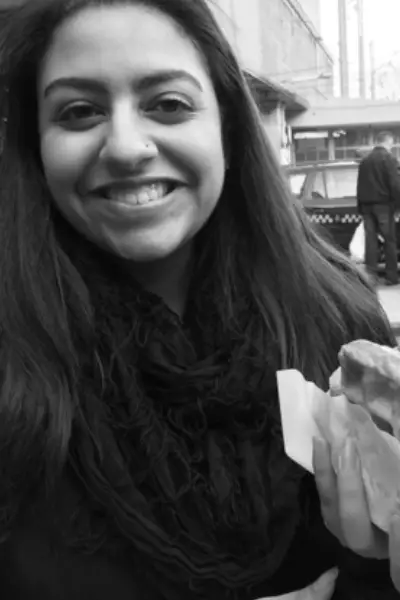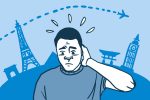Last summer, just before I left to study in Spain for the year, the program I studied with mailed me a package of pre-departure papers, most of which I didn’t read. One paper, however, caught my eye: it was a graph about assimilating to living abroad and then re-assimilating after returning home, and the trajectory looked like one of those terrifying old-school wooden roller coasters.
First there was a hill of initial excitement, then valleys of homesickness and FOMO, then a brief peak of loving life abroad, then finally a plummet downward into the stomach-in-your-throat feeling of going home. In other words, it didn’t look like a ride I would want to take. Luckily I didn’t see this graph until after I was already strapped in and registered to study abroad.
Now nine months later I’m back and realizing that the weirdest part of returning from abroad isn’t the steep hill, but the slow roll back into the station (drop the extended metaphor now? I hear you)—getting back in touch with friends face-to-face, living at home and having actual responsibilities. But like FDR, I’m determined to have a successful first hundred days back home so that the inertia (hopefully) propels me well into the school year. For any other returning study abroaders, here are some guidelines I’ve created for a triumphant re-entry:
Do: Gorge yourself on all the foods you missed.
Peanut butter, bagels, pancakes—the list goes on. My host country had weird imitations of all of these, but unsatisfying knock-off versions, like dry disks served without syrup that they audaciously called pancakes.
Write down all the guilty pleasures you’ve been going through withdrawals for, maybe Cronuts or deep-dish pizza, and then eat them all. They’ll taste ten times better since the urge to consume them has been building up for several months—it doesn’t take a tornado to realize “there’s no place like home,” just some mouth-watering carbs.
After you’ve doubled your bodyweight, probably eat solely vegetables for the next year since, if you’re like me, you already doubled your BMI while studying abroad. And while doubling is no biggie, the Sergeant General would likely frown upon quadrupling within the span of a year.
Don’t: Continue to talk about passersby in English without restraint.
“Do you have any Midol? I feel like I’m giving birth to a porcupine.” “I haven’t washed my hair in five days, is that gross?” “Oh my god he’s so good-looking. That guy—no that guy over there, by the doors.” What do all these sentences have in common? They were all said by me or my friends in normal speaking voices on the Spanish metro.
Because most European schools teach English as a part of their curriculum, figuring out what I was saying was probably only as difficult as decoding Pig Latin (oopsyay, ymay adbay). But stateside, English is definitely not an invincible gossip shield. The other day a guy with a truly unflattering man bun walked by and turning to my friend I said, “Ooo that’s not a good look, I feel like the man bun thing has had its day.”
She wide-eyed me—“He can understand you!” I couldn’t bring myself to make eye contact, but I can only imagine the hipster’s ego was wounded. Moving forward I’ll make friends not enemies, and keep my pointless critiques to myself. Or maybe learn a more obscure language.
Do: Unpack your suitcases.
This article is also doubling as my to-do list, because I have yet to empty any of my luggage. But I anticipate it will be a crucial step in improving my mental and physical health. Mental, because I’ll be tangibly moving back into my house, making it feel like home once again, and reliving bits of nostalgia as I put away certain items. And physical, because my stuff is currently splayed all over my floor, so I keep tripping over it and almost spraining my ankle.
Plus, you trekked them across the ocean, or at least hauled them off a conveyor belt, possibly dislocating a shoulder in the process, so you might as well take advantage of what’s inside of them.
Don’t: Bring up study abroad in any and every conversation.
Along with an expanded worldview and passport full of stamps, a less glamorous side effect of studying abroad is being unable to shut up about it.
You know that family friend who always makes a Powerpoint of their pictures when they come home from a cruise, beginning the story of each picture with, “Ha! Oh man this is a good one”? Don’t be that person.
“But it’s a-different” you start to say in an unrecognizable accent.
Yes, to you, but after the one-hundredth photo they all start to look and sound pretty similar to everyone else. While friends and family are probably excited to have their world traveler home, they don’t need to hear about every mundane detail.
Some sample “don’t” conversations:
Innocent bystander: Hm, I can’t find my keys.
Person riddled with Study Abroad Syndrome: Oh wow, that reminds me of this time in Paris, where the keys for our hostel weren’t working and, god it was so funny. *laughs uncontrollably*
Grocery clerk: That’ll be $18.15.
SAS Sufferer: It’s just so weird to be paying in dollars again! In Europe they mostly use euros.
Victimized friend: Do you wanna go out to eat or order in?
SASer: Oh my gosh, speaking of Spain…
Instead save the great stories for friends and family, and text the boring stuff to your friends from abroad who’ll eat it up as much as you do. Or just victimize your parents who are obligated to keep loving you.

















